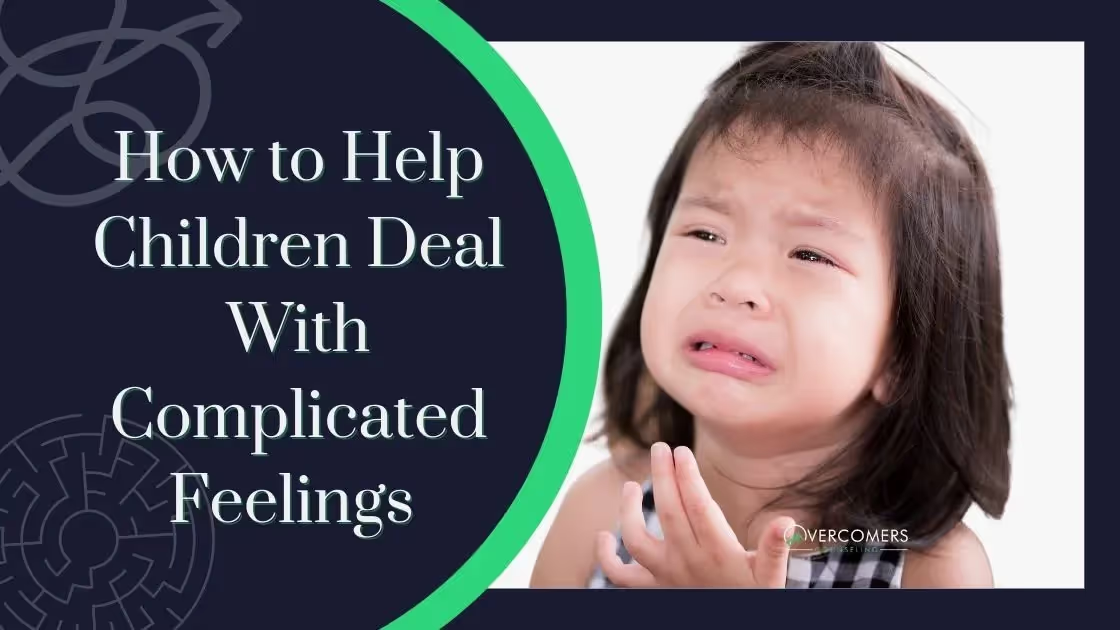Naturally, we try to defuse stressful events for children instead of devising ways to help children deal with complicated feelings so they can form healthy...

Naturally, we try to defuse stressful events for children instead of devising ways to help children deal with complicated feelings so they can form healthy connections with their emotions.An effective way to help kids accept complicated feelings is to teach them mindfulness which is a technique that can help them relieve stress by focusing on the present and observing feelings in a passive state.Another way to help is to explain the purpose of each feeling and how they are in everyone to guide us, give information about our current circumstances, and give us pointers for decision-making.Equally, encouraging emotional awareness is a method that will help the kids recognize their emotions, deconstruct them into manageable bits, and validate the experience of having the feelings.Similarly, you may consider using play as an opportunity for kids to process and communicate their feelings while having an outlet for stressful or negative emotions.You may use any of these methods to help children deal with complicated feelings:
Mindfulness is a technique that can help children deal with complicated feelings by aiding them in getting awareness of the events happening around them in the present moment, ensuring there’s no distraction from their anxious thoughts.You can teach children this technique by helping them become aware of their bodies and movements through games or activities designed to enhance such awareness. Introducing them to journals can also be a way to learn mindfulness because writing their daily activities enables them to keep conscious track of the events for record purposes.An exciting activity that can help them quickly cultivate this technique is smelling roses, which involves engaging their sense of smell with a flower and asking them to concentrate on the scent.You can also show them the ancient meditation technique of counting their breaths to help them center their awareness on their lungs and how the body responds to breathing.
Generally, feelings are signs that help us confirm our paths and guide our decisions; thus, understanding the purpose of feelings can help children deal with complicated feelings.Teach the kids how emotions can motivate them to perform positive acts, giving examples of how the fear of failure can push them to read more to get better grades.Also, you can educate them on how emotions help them avoid danger through the body’s fight or flight response triggered by the fear of possible injury and assists them in fleeing to safety.When teaching them, you can expose them to the significant influence of feelings on the decision-making process and how dealing with their emotions can help them make better decisions.Ensure you don’t forget to tell them that feelings allow them to interact with others and express their feelings while also understanding other people’s feelings and responding appropriately.
Nurturing emotional awareness and intelligence can help children deal with complicated feelings because it makes them understand what they are going through and learn how to manage their current emotions.A great way to nurture their emotional awareness is to acknowledge their perspective and empathize with them about their troubling emotions, thus soothing them and teaching them how to take care of themselves emotionally.Another way is to accept their emotions and allow them to express their feelings rather than disapprove of the expression of emotions which can cause repressed emotions.Also, ensure you listen to their feelings and resist the instinctual urge to disregard those feelings away, so they can share them with you, let them go, and move on with their lives.In encouraging emotional awareness, it’s essential that you teach them problem-solving by showing them how to calm down when experiencing any complex emotion before taking any action.

Learning how to deal with the discomfort associated with difficult emotions can help children deal with complicated feelings and widen their comfort zones, enabling them to adapt to various situations in the future.To help them, teach them how to identify their struggles and accept difficult situations so they may recognize and feel the ensuing disappointment while they build their strength for future comfort in such cases.You can also teach them how to slow down in life, ensuring that they remain focused and self-aware despite the fast pace of modern life that consists of many distractions and disastrous shortcuts.Staying positive in the face of complex emotions is another method that can help them build tolerance because it allows them to keep an upbeat spirit that helps to maintain a favorable reaction in all circumstances.When helping them build a tolerance to the feelings, ensure that you break the process down and teach them in manageable bits to ensure easy comprehension and motivation from completing the beginning steps in the process.
Play is a vital component of growth for kids, and their involvement in it can help them experience social and cognitive development and help children deal with complicated feelings.To help them regulate their emotions, you can make them participate in pretend play as it offers them an opportunity to use their imagination to express feelings in a mentally safe space that’s not the real world.You may equally engage them in physical play that will tire them out, enabling them to release pent-up emotional anxiety or frustration by giving them a non-destructive outlet for their charged emotions.When introducing the play, try to involve other kids in the activities because the presence of other kids can help them express their emotions to others in their age group and gain another perspective on their complicated emotions.You can also make the play a dramatic one, allowing the kids to reenact stories or TV shows, gain an insight into the characters' struggles, and realize that they can adapt to the problem-solving techniques used by the characters.
When children experience complicated feelings, and you decide to help by making the troubles go away, you may be causing more emotional harm in the long term.Therefore, it’s infinitely better to help children deal with complicated feelings by teaching them mindfulness, enlightening them on the purpose of their emotions, encouraging emotional awareness, helping them build a tolerance to their complex feelings, and introducing play to help them process properly.
https://www.verywellmind.com/the-purpose-of-emotions-2795181
https://www.verywellfamily.com/ways-to-teach-mindfulness-to-kids-4134344
https://www.ahaparenting.com/read/steps-to-encourage
https://familytherapyllc.com/blog-template-2/
https://littletikescommercial.com/blog/how-children-use-play-to-express-their-emotions/?lang=can
https://www.gottman.com/blog/6-ways-to-help-children-accept-difficult-emotions/
Help your child by providing support and guidance, using positive language, highlighting the progress they have made, breaking down the challenge into smaller steps, and motivating them with positive affirmations.